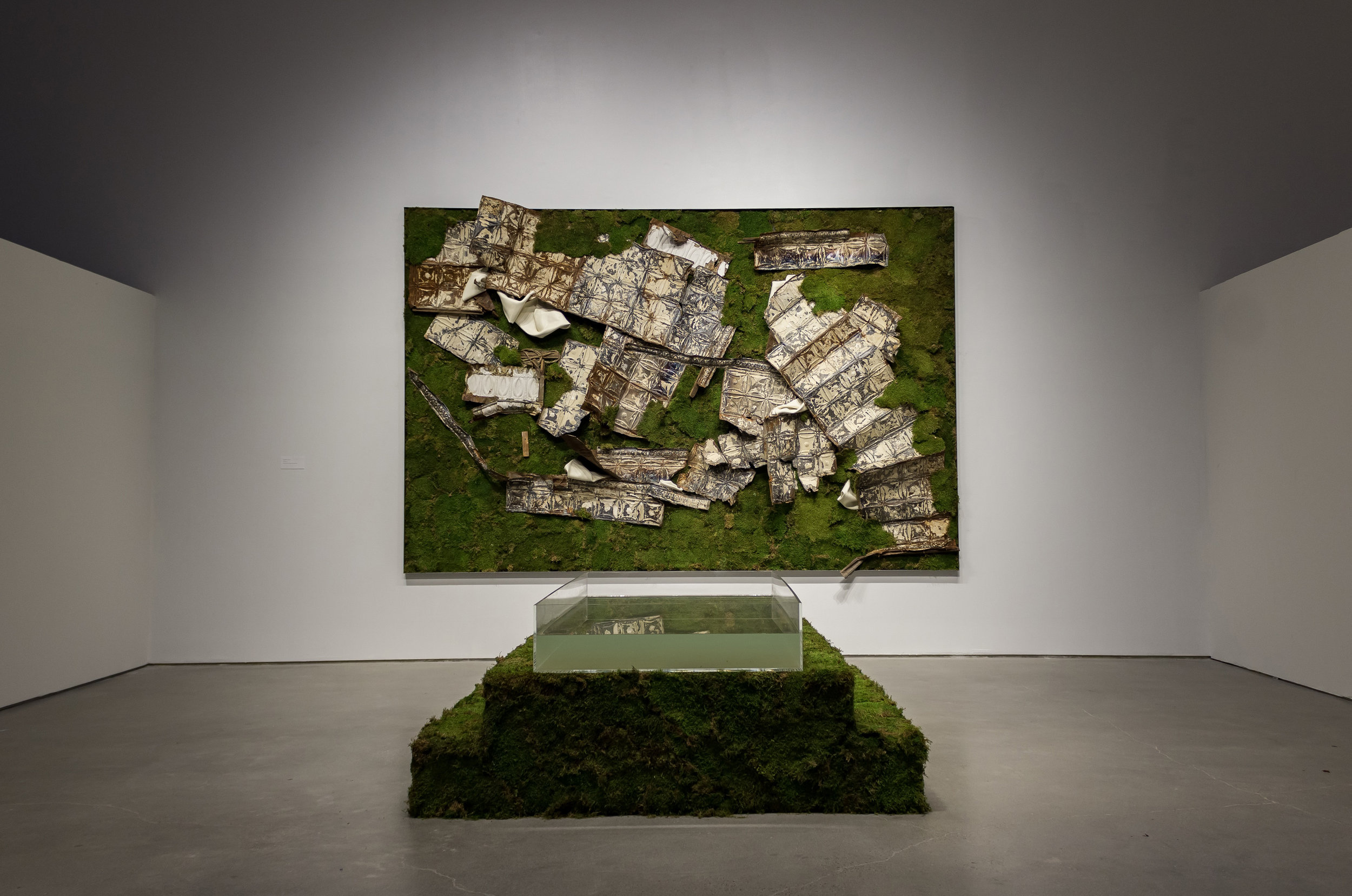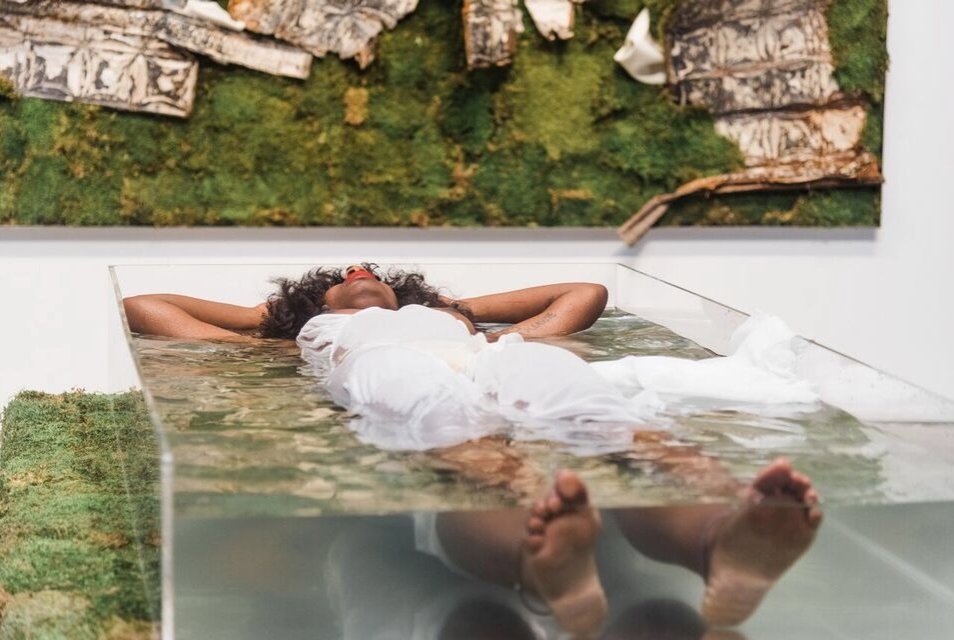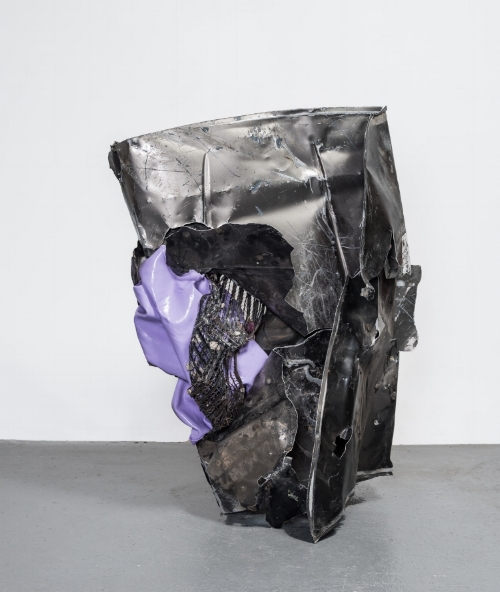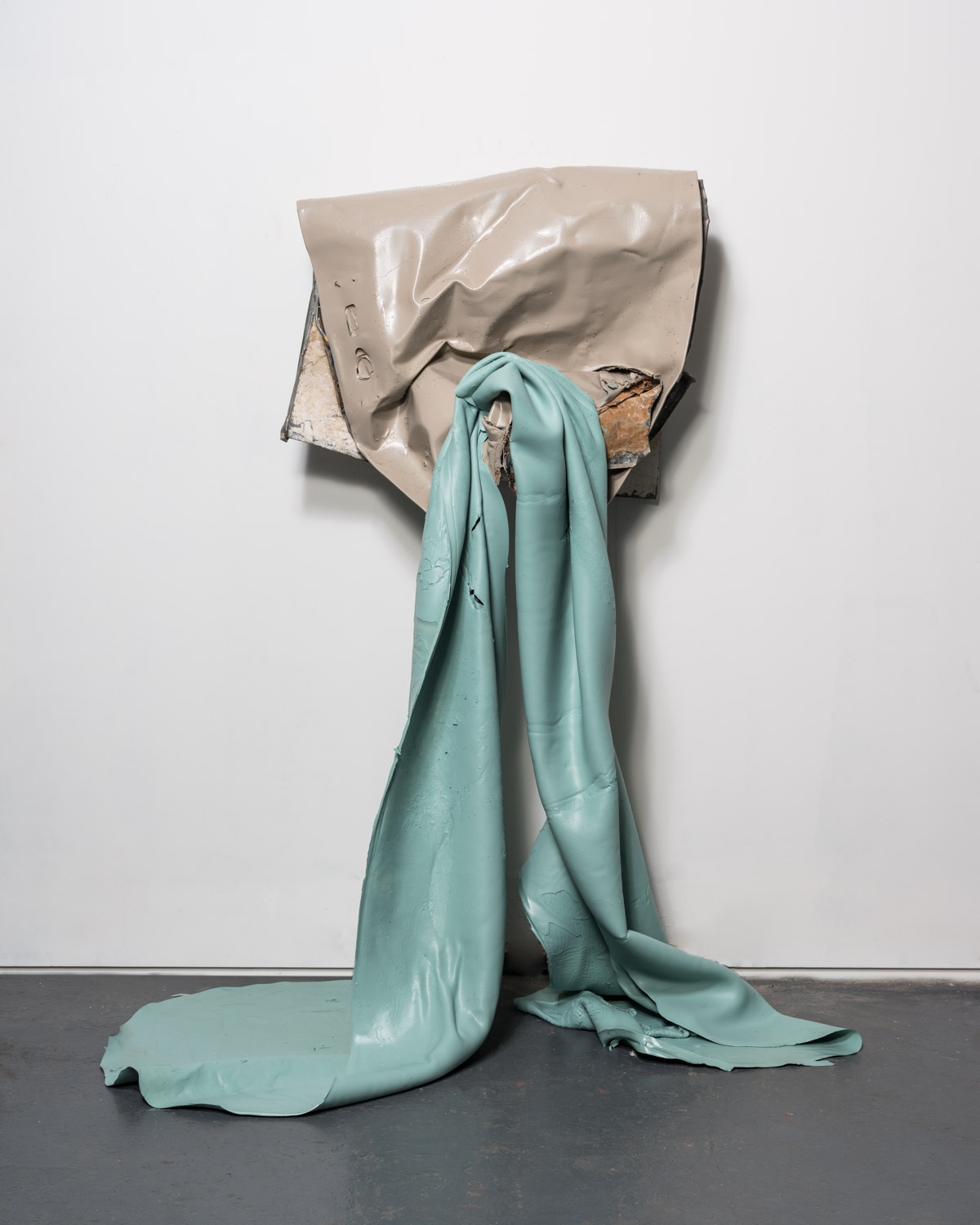From Lead to Gold
“Face to Face” with painter and sculptor Kennedy Yanko
It is a strange endeavor to write about art– stranger, even, than writing about literature, as it has us fashion words to describe what is fashioned with material. It is in encountering an artist like Kennedy Yanko, whose work is concerned with the reincarnation of material, that I feel this strangeness even more acutely. I first came across Yanko at Brooklyn’s BRIC, where she had installed Feel For, a multi-piece, monumental work on view this past summer. In it, a pedestal bearing a plexiglass pool of still water stood at the foot of an enormous panel that appeared to be a vertical garden– a vertical garden that had been abandoned, covered in folded pieces of discarded old fashioned tin ceiling slowly being overtaken by creeping moss. In between these sheets of metal were folded pieces of white latex, or “skins,” which are a Yanko signature.
Feel For (2018), installation view (Photo by Tone Woolfe.)
The title of the show was Alchemy, and its theme, which centered on the manifold presentations of unique materials, was perfectly suited to Yanko’s modus operandi. How can one recontextualize material to appear differently than it might in another context? How can one deconstruct preconceived notions about a substance and replace them with something else? The show featured (among others pieces) caution tape woven into bees’ nests (Borinquen Gallo), pooling tar as a stand in for black skin (Nicole Awai), and Yanko’s work, which recasts industrial materials as products from nature.
Feel For included a performance by artist Nana Ya Asare Boadu (Photo by Tone Woolfe.)
In describing Yanko’s pieces, I, too, am engaged in an alchemy of sorts. In transferring material from workshop to word there is surely something that changes, maybe even is lost, as art morphs into language. It is in the space between art and words that we have the freedom to interpret, but with each new translation we confront the danger of imprecision or falsity. That is, when writing about art, there is such thing as the wrong context.
One of these mistranslations is putting Kennedy Yanko’s sculptural paintings in gendered terms. If we reduce her work to a feat of physical strength, something of its impact is diminished. While there’s no doubt that Yanko cuts a striking figure in a welder’s helmet, the temptation to talk about her as a woman is “just another distraction from my work,” she says. You could ask her, “what’s it like to be a woman sculptor?” to which she would respond, “I don’t know, what’s it like not to be a woman sculptor?... I don’t feel like I need to go through [explaining] that.”
Instead, Yanko’s work is intuitive enough not to need justification. After all, abstraction is the anti-word, as it does not ask you to make intellectual sense of it. “I’m thinking about what [the work is] going to feel like. In abstract work, what people don’t realize, it’s all about what’s happening inside of you as a responder and as a viewer,” Yanko says of her process.
Violet Lead (2018). (Photo by Kris Graves.)
So what does it feel like? The appearance of rubber skins folded and stuffed in between marble slabs or contorted sheets of metal surely elicits a visceral response to its contrasting textures. But by spending another moment with these pieces, we begin to sense an affinity in these materials, as if they stem from the same source. As if they belong together. Which, as with all things, they do. When I asked Yanko what she thinks about most when making her pieces (with the intention of minimizing the possibility of losing something in translation), the answer was this affinity, this quasi-spiritual “oneness.” She likes to focus on how reducing metal to its component parts– its atoms of calcium and magnesium– makes it not much different from a flower. Affinities can, somewhat paradoxically, be rooted in apparent contradiction.
Splay (2018). (Photo by Kris Graves.)
Decontextualizing material is the route to understanding materials’ innate oneness. Much of the way we conceive of the world is through associations, and when materials are presented in the same way again and again, these associations grow stronger, boxing them into single definitions. Yanko seeks to break these connections and renew meaning. If we imagine the places where the artist forages for metal, it is easy to think of it as an industrial material. At these various scrap yards across Brooklyn enormous beams and metal sheets are moved by a huge swinging electromagnet– surely as precise a visualization of the word “industry” as any. But when I mistakenly assert that metal is not a material that’s amenable to the artist’s hand, Yanko contradicts me, saying it’s actually “quite soft.” And once she works on these pieces, bends and welds and crushes them into their desired shape, they become “delicate”– no longer refuse, but a piece of artwork. Suddenly scrap metal is precious, fragile, like a flower, but this time not just in its chemical makeup.
*
It matters where we place things. Whether we talk of Yanko as a creative descendent of John Chamberlain versus of Lynda Benglis (I personally say neither, but more of a Ruth Asawa in her espousal of Universalism), or focus on her as a painter versus as a metalworker, a woman versus a person, a New Yorker versus a Midwesterner (she was born in St. Louis), it makes a difference. If alchemy is the practice of turning lead into gold, then Yanko is an alchemist when it comes to her materials. And as for us writers? We must be careful not to do the opposite. We have a responsibility to our artists not to allow such gold to return to lead in our hands, to take art and render it lifeless.
Kennedy has an upcoming solo show at Denny Dimin Gallery on the Lower East Side. It opens in January 2019– don’t miss it.
Find more on Kennedy here.




